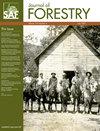Underplanting is a practical silvicultural method for regenerating and diversifying conifer stands in Britain
IF 3.2
2区 农林科学
Q1 FORESTRY
引用次数: 5
Abstract
There is a strong policy move in Britain to improve forest resilience to climate change by increasing stand structural and species diversity. Although currently little used in Britain, the technique of underplanting allows regeneration and diversification of stands while avoiding some of the disadvantages of clearfelling. Two experiments were examined: (1) the growth and survival of five underplanted conifer species of differing shade tolerance in a shelterwood and (2) compared performance of underplanted and open-grown Douglas-fir seedlings on restocking sites. Underplanted Sitka spruce, Norway spruce, noble fir, European silver fir and Douglas-fir were all able to survive and grow. However increased exposure following overstorey removal resulted in some damage and ‘socketing’, especially to taller seedlings, particularly Douglas-fir. This may be linked to poor root development when growing under an overstorey. Microclimate conditions on some underplanted sites were more sheltered from extreme climatic conditions, and in some cases this improved survival of Douglas-fir seedlings. However, seedling growth rates were reduced compared with those on open sites probably due to lower light levels. Underplanting may help to improve establishment success of some species, particularly in exposed areas. However, the shelter benefits of underplanting must be carefully balanced against the trade-off with lower light, and underplanting is likely to be more successful where low canopy density is maintained.下植是英国针叶林更新和多样化的一种实用的造林方法
英国出台了一项强有力的政策,通过增加林分结构和物种多样性来提高森林对气候变化的适应能力。虽然目前在英国很少使用,但这种技术可以使林分再生和多样化,同时避免了砍伐的一些缺点。研究了两项试验:(1)林下种植的5种不同遮荫耐受性的针叶树的生长和存活;(2)林下种植和露天生长的道格拉斯冷杉幼苗在复植地的表现。西特卡云杉、挪威云杉、贵族冷杉、欧洲银杉和道格拉斯冷杉都能存活和生长。然而,在拆除上层后增加的暴露导致了一些损害和“插孔”,特别是对较高的幼苗,特别是道格拉斯冷杉。这可能与在上层下生长时根系发育不良有关。在一些低植地的小气候条件更不受极端气候条件的影响,在某些情况下,这提高了道格拉斯冷杉幼苗的存活率。但由于光照条件较弱,幼苗生长速率较露天低。林下种植可能有助于提高某些物种的建立成功率,特别是在暴露的地区。然而,必须谨慎地平衡下层种植对遮蔽的好处与较低光照的权衡,在保持低冠层密度的情况下,下层种植可能更成功。
本文章由计算机程序翻译,如有差异,请以英文原文为准。
求助全文
约1分钟内获得全文
求助全文
来源期刊

Forestry
农林科学-林学
CiteScore
6.70
自引率
7.10%
发文量
47
审稿时长
12-24 weeks
期刊介绍:
The journal is inclusive of all subjects, geographical zones and study locations, including trees in urban environments, plantations and natural forests. We welcome papers that consider economic, environmental and social factors and, in particular, studies that take an integrated approach to sustainable management. In considering suitability for publication, attention is given to the originality of contributions and their likely impact on policy and practice, as well as their contribution to the development of knowledge.
Special Issues - each year one edition of Forestry will be a Special Issue and will focus on one subject in detail; this will usually be by publication of the proceedings of an international meeting.
 求助内容:
求助内容: 应助结果提醒方式:
应助结果提醒方式:


